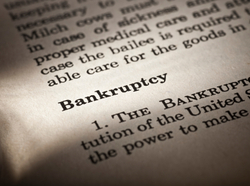There is current legislation before both the US Senate and US House of Representatives that would allow private school loans to be discharged in bankruptcy, as most of them were before the Bankruptcy Abuse Prevention and Consumer Protection Act of 2005. Legislators are reasoning that there is a strong interest in not allowing federally backed student loans to be discharged in bankruptcy, but these reasons do not apply to private school loans and so they are rethinking the laws. The New York Times wrote an interesting article on the topic.
To see if your loans qualify for discharge, contact a Jacksonville Bankruptcy Attorney today to discuss your situation.
 Jacksonville Bankruptcy Lawyer Blog
Jacksonville Bankruptcy Lawyer Blog



 There are many reasons that it would be advantageous to file for bankruptcy, but here are some of the most common reasons:
There are many reasons that it would be advantageous to file for bankruptcy, but here are some of the most common reasons: